Sports, one of the co-curricular activities taught in schools and colleges, are seen as important to stay active and fit. However, apart from providing physical and mental well-being, sports teach students many other life skills that stretch far beyond the four corners of the field. If you try to understand the concept of sports, you’ll see it’s a way of living that teaches students how to lead a disciplined life. It’s the practice of keeping up with a high-quality and punctual lifestyle that strengthens students to face every phase of life with utmost courage and integrity. Sports is a complete package of life lessons that shape the character of student-athletes, pushing them beyond their capabilities to outshine others.
Whether it’s putting on similar team collegiate wear or teamwork with fellow players, each of these acts contributes to the bigger picture. As the fundamentals of sports go far beyond the stereotypical, it teaches resilience, discipline, teamwork, and leadership—all vital skills that contribute to personal growth and success in life. In this guide, we’ll learn how sports help build resilience and the ability to thrive both on and off the field.
How Can Sports Teach Students Beyond the Field?
- Dealing with setbacks and failures positively:
Determining the result of a sports match beforehand isn’t possible. It’s all about staying on the fine edge of winning or losing with every score. Such uncertainty in sports shapes players to handle their failures and setbacks better. Sports has always been about giving tough matches to rival teams, where only one team can win after each game. Such fragility teaches athletes to face losses or disappointing performances sportingly only to recharge and revive to outperform in the next match. These moments prepare players to accept failure, learn a lesson from it, and move on to become a better version of themselves. Bouncing back from failure is essential to overcome personal or professional challenges. Thereby challenging athletes to grow beyond their limitations and outshine.
- Developing leadership skills:
Regarding working on self-improvement and learning essential life skills, sports offer the utmost important ground for individuals to nurture themselves. Sports give athletes opportunities to work and develop their leadership skills by carrying out essential responsibilities in the athletic world. Whether it’s to ensure everyone has worn the same team sports apparel on the field during practice or a player stepping up during crucial sports moments, athletes grow.
This growth helps them to take charge during challenging game situations, motivate fellow players, and often make critical decisions under pressure. Since leadership is about leading the team and encouraging teammates to boost their morality, players adept these qualities flexibly. Such qualities further benefit their personal and professional lives, where they can easily guide others and tackle high-pressure situations.
- Learning to value teamwork:
In many sports like soccer, basketball, and volleyball, success comes from working together as a team. Players need to communicate, cooperate, and trust each other to achieve their shared goals. While individual skills matter, teamwork is what leads to winning. This teamwork lesson is just as valuable in life, especially at work. Whether it’s working on a group project or collaborating with coworkers, knowing how to work well with others is a skill sports help develop. Teamwork also builds strong bonds and mutual respect, which are important for creating good relationships in any setting.
- Working on self-discipline:
Have you ever looked at successful players who have earned fame in the sports world and wondered what’s the secret behind their success? Well, the answer is quite simple—self-discipline. Discipline is the key that can even turn an average player into the best athlete through commitment, sacrifices, and a structured lifestyle. From waking up early in the morning for regular training to avoiding unhealthy habits, leading a positive life helps athletes learn the value of discipline and consistency.
However, being self-disciplined is not only important to succeed in sports but also to win everyday personal and professional responsibilities. Whether it’s completing a project on time or committing to healthy habits and personal growth, the habit of discipline developed through sports enables individuals to achieve their goals.
- Managing stress and pressure:
Athletes often deal with high-pressure moments like taking the final shot in basketball or running the last part of a relay race. Sports teach them to stay calm and focused and perform well under pressure. In life, we all face stress, whether it’s a deadline at work, financial issues, or personal challenges. Sports help people learn how to handle stress, stay calm, and do their best, even when things are tough. This skill is important for building resilience and staying confident, no matter what challenges come their way.
Final Thoughts
Sports not only help athletes stay involved in fitness that contributes to their health, but they also teach powerful life skills. As sports introduce players to many challenging situations in life, it eventually prepares them to face the outer world with confidence and determination. Embracing the lessons of sports can lead to personal growth, stronger relationships, and greater success, proving that the value of sports extends far beyond the game.
